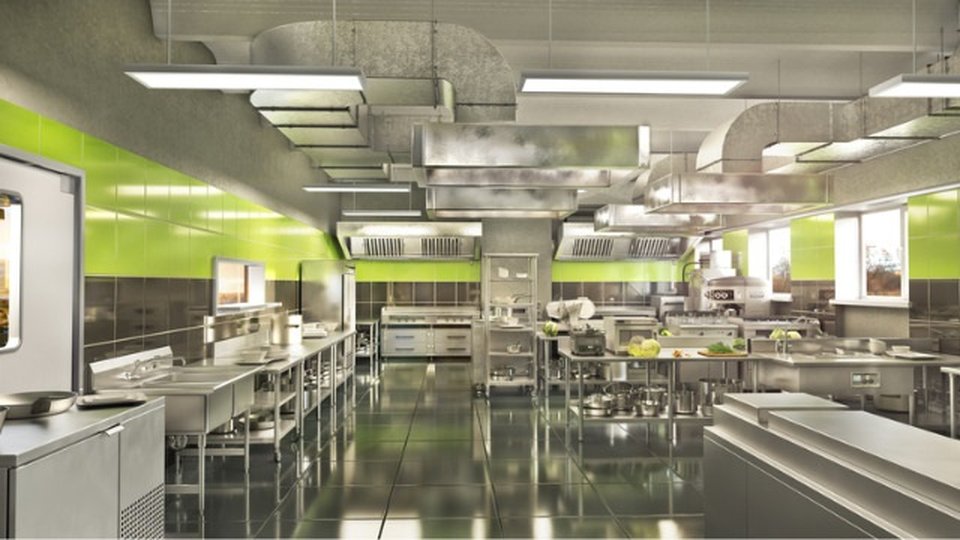Blog
Deep dive: Does your food truck operation need a commissary kitchen?
Many food trucks are turning to a commissary kitchen for various reasons: need for space, ability to handle large event orders and to help reduce waste when it comes to time and resources. This first part of a two-part series examines what a commissary kitchen is all about and why it may be a good option for your food truck operation.

March 16, 2020 by Richard Traylor — Writer, WebstaurantStore
Over the past few decades, food trucks have exploded in popularity because they are an excellent opportunity for chefs to open their own foodservice business without buying a brick-and-mortar store. But, one of the main downsides of opening a food truck is the lack of space for storage and food prep. So, many food truck operators have turned to commissary kitchens or renting a commercial kitchen. These kitchens provide many of the benefits of a brick-and-mortar store, but there are also a few downsides to consider.
So let's take a look at what a commissary kitchen is and whether it's a good option for your food truck operation.
What are commissary kitchens?
Commissary kitchens are established commercial kitchens where foodservice providers can go to prepare and store their food. Some commissary kitchens cater specifically to food trucks and mobile food businesses, but others may be businesses that just rent out their kitchen space for some extra income.
Different types of commissary kitchens
There are several different types of commissary kitchens to choose from, so you can find one that matches your needs and price point. Here are the four major types of commissary kitchens:
1. Shared commercial kitchen: This is the most viable option for new food truck owners who are looking for an economical cooking space. These kitchens are leased out to multiple food trucks, caterers, and pop-up chefs at once. These businesses share the space and are usually assigned specific storage areas and time slots when they can use the kitchen. A shared space is ideal because the rent is split among several businesses, but working out a schedule among the various chefs can be difficult.
2. Private commercial kitchen: If you need access to specialized equipment or more time and space to work, a private kitchen might be the right fit for your business. In a private kitchen, you take on the whole lease yourself, meaning you have full access and don't need to share the space with anyone else. These are an excellent option for businesses with multiple food trucks or locations, because you can use them as a central hub to prepare all your food before sending your trucks out for the day. You also won't have to worry about the kitchen being cluttered with equipment and ingredients you don't need. On the other hand, though, renting a private commissary kitchen is much more expensive, and may not be an attainable option for small or new food trucks.
3. Renting a restaurant's kitchen: Another option is to rent a restaurant's kitchen during their off hours. This is a good compromise between a shared and private kitchen space, because you get the entire space to yourself, but the cost won't be as high as renting your own kitchen. Plus, because the restaurant hours are set, you know exactly when you can use the kitchen. But, a restaurant may not offer the same amenities, like parking, that you'd find in a commissary kitchen.
4. Non-traditional sources: There are other spaces that have kitchens for rent that you can also pursue. Churches, social clubs, schools, and retirement communities all have kitchens that are up to code and have commercial-grade equipment, and these businesses may be willing to rent out their space during off hours as well. Similar to renting a restaurant's kitchen space, these non-traditional locations are a great way to save on your rent costs while gaining access to a large commercial kitchen with equipment, but they won't offer as many amenities as a standard commissary kitchen.
Why use a commissary kitchen?
So why do food truck operators choose to use commissary kitchens? Here are few reasons:
• Commissary kitchens are convenient. Food trucks are narrow and crowded, which makes it difficult to do prep, especially with several chefs moving about at once. Commissary kitchens are larger and provide chefs with room to spread out for their prep work.
• With a larger space comes more room for equipment. Most food trucks can only fit a few pieces of equipment in their kitchen, but commissary kitchens provide access to all sorts of kitchen appliances and gadgets.
• Renting a commissary kitchen is cheaper in the short term than buying a brick-and-mortar space. Additionally, commissary kitchens are fully equipped, so food trucks don't have to pay to outfit the space with appliances.
• In some cities and regions across the United States, it is illegal to prepare food inside of a truck. So, food truck owners in those areas have to use commissary kitchens to prepare their food before going out to sell it.
Ins and outs of renting a commercial kitchen
When considering whether renting a commercial kitchen is the right choice for your business, consider how much space and time you will be spending in the shared space. If it is realistic for you to share the commercial space without becoming crammed, renting a kitchen might be the right choice.
It is usually cheaper to rent kitchen space based on how many times a month or week you will be using it. Renting by the hour can be the most expensive option and might not be cost-effective for your foodservice business.
Always consider the future, and outline how much revenue you will be making per month. If you are outgrowing the space, it may be time to invest in your own kitchen and try taking on a lease of your own.
Do you need a commissary kitchen?
So how do you find out if you need to use a commissary kitchen to comply with local laws? It takes some research and legwork on your part. Most major cities will have clear laws and regulations for food trucks. But because food trucks are a relatively new concept, some small cities and suburban areas may not have created their own laws yet. Before you start up your truck, reach out to your local government and ask for guidance. You shouldn't just assume that it's okay for you to cook in your food truck.
About Richard Traylor
Richard Traylor graduated from Temple University in the winter of 2014 with a degree in Strategic Communications. After graduating, he taught English in South Korea for two years, during which he was fortunate enough to travel and see the world. In October 2016, he returned home and started to work in SEO Content at Webstaurant Store. This blog previously ran on Webstaurant Store.
 ChatGPT
ChatGPT Grok
Grok Perplexity
Perplexity Claude
Claude





